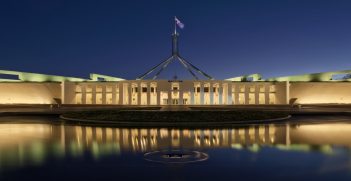1 July: The Week in Australian Foreign Affairs

This week in Australian foreign affairs: Albanese attends NATO Leaders’ Summit Meeting and will meet with Macron in Paris, Wong visits Malaysia and Vietnam, Plibersek addresses the UN Ocean Conference, and more.
On 26 June, Prime Minister Anthony Albanese travelled to Madrid, Spain for the NATO Leaders’ Summit Meeting. Australia was invited to attend the Summit as an Enhanced Opportunities Partner. Albanese noted that as an Enhanced Opportunities Partner, Australia “has worked closely with NATO on interoperability, military training and exercise programs, and other issues of mutual interest.” He further stated that the Meeting “comes at a critical time” and that “[t]he conflict in Ukraine has significant consequences that reach far beyond Europe.”
While in Spain, Albanese met with Spanish President Pedro Sánchez Pérez-Castejón for bilateral talks on 28 June. The leaders released a joint statement noting that Albanese’s trip marked the first bilateral visit to Spain by an Australian Prime Minister. They “reaffirmed the warm and productive relationship between Spain and Australia, underpinned by shared values, a commitment to multilateralism and the international rules-based order and close economic ties.” The leaders further discussed “the strong growth in the bilateral economic and trade relationship”, “reaffirmed their commitment to the swift conclusion of a comprehensive and ambitious Australia-EU Trade Agreement”, and their “long-standing defence industry cooperation.” Moreover, they condemned Russia’s “unilateral, illegal and immoral war of aggression against the people of Ukraine.”
Following his attendance at the NATO Leaders’ Summit Meeting, Albanese will then travel to Paris to meet with President Emmanuel Macron. He stated that he is “honoured” to accept the invitation from President Macron to visit Paris, and that “France is an important partner and friend to Australia, particularly in our shared vision for peace and stability in the Pacific.”
Minister for Foreign Affairs Penny Wong travelled to Malaysia and Vietnam on 25 June. She noted that “Australia’s future is tied to the future of Southeast Asia, a region we share” and that it is “important [that] we work closely together to capitalise on shared economic opportunities, strengthen regional security, and address climate change.” Wong met with Vietnamese President Nguyen Xuan Phuc, Prime Minister Pham Minh Chinh, and Foreign Minister Bùi Thanh Sơn, with discussions focused on “climate change cooperation, our shared trade and investment ambitions and Australia’s continued support for Vietnam’s COVID-19 recovery.”
While in Malaysia, Wong delivered a keynote address on 29 June, where she reflected on her personal ties to the nation, discussed the bilateral relationship, and reaffirmed ASEAN centrality. She noted the Comprehensive Strategic Partnership that the two countries signed in 2021, referring to it as “a strong basis for deeper cooperation, but we can do more.” Wong further stated that she wants the two nations to “modernise [their] trade relationship, so we can take up more opportunities in the digital economy and face challenges like cyber security.”
On 26 June, Wong announced that Australia will provide an additional $1 million in emergency relief to support the people of Afghanistan, following the “devastating earthquake” a few days prior. She noted that this relief is in addition to the $140 million pledged to Afghanistan since September 2021. Wong stated that the support “will be delivered through UN agencies already operating in the affected area, and will go towards providing shelter, food and medical support for those in need.”
Wong and Minister for the Environment and Water Tanya Plibersek issued a joint statement on 25 June noting that the Australian Government is contributing $80 million over four years to the Global Environment Facility. The Facility is an “international effort to help developing countries tackle urgent environment pressures and reduce the impacts of climate change.” This contribution “builds on Australia’s support for the Facility since its inception over 30 years ago”, and forms part of the Government’s $2 billion climate finance package from 2020-2025. Wong noted that “[c]limate change is the single greatest threat to the livelihoods, security and wellbeing of the peoples of the Pacific” and that “[t]he urgency of climate action for our Pacific family is raised with me everywhere I go.”
Plibersek addressed the United Nations Ocean Conference in Lisbon, Portugal on 28 June. In her speech, she reaffirmed Australia’s endorsement of the Joint Declaration on the Creation of a Global Coalition for Blue Carbon, which she stated “has the potential to complement the research and programs that Australia helps coordinate through the International Partnership for Blue Carbon.” She further noted that “there is no such thing as a healthy environment or healthy oceans without action on climate change. And we can’t tackle climate change without action on our oceans. Ambition is our only option.” Finally, Plibersek stated that Australia is “not just willing to do our bit, we’re willing to step up to join our partners in showing global leadership.”
The Australian, Japanese, New Zealand, United Kingdom, and United States Governments launched the “inclusive, informal” Partners in the Blue Pacific (PBP) Initiative on 25 June. In a joint statement, the PBP members noted that the initiative “builds on our longstanding commitment to the region” and that they “maintain close people-to-people ties and are longstanding development partners in the Pacific Islands.” The PBP Initiative is directed “according to the principles of Pacific regionalism, sovereignty, transparency, accountability, and most of all, led and guided by the Pacific Islands.” It will seek to achieve three main goals: “deliver[ing] results for the Pacific more effectively and efficiently”, “bolster[ing] Pacific regionalism”, and “expand[ing] opportunities for cooperation between the Pacific and the world.”
Isabella Keith is a weekly columnist for Australian Outlook. She is also an undergraduate student at the Australian National University studying Law and Politics, Philosophy and Economics. Isabella’s research interests include international law and comparative constitutional law.
This article is published under a Creative Commons License and may be republished with attribution.




